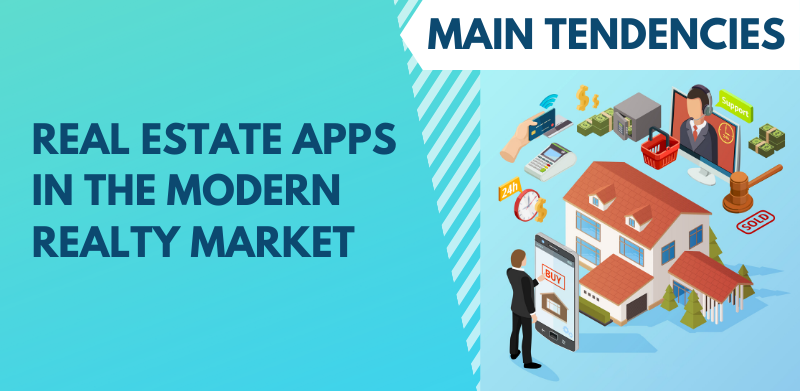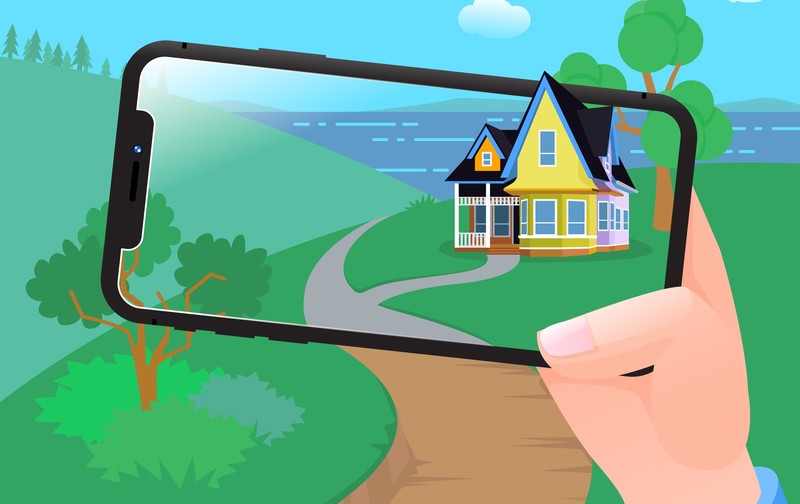Real estate has long spread beyond the newspaper announcements as a service industry. The World Wide Web has become a major source of realty offers globally. In 2018, 73% of all real estate deals made in the USA took place due to the initial online search.
About five years ago, people were mostly looking for accommodations through web browsers, which formed a global tendency for most agencies to launch dedicated websites. In 2017, everything started escalating in favour of mobile - 63% of mobile views against 57% in 2016.

The prevalent age category mostly searching realty offers via a smartphone are millennials - young people 20-30 years of age. The statistics of mobile search relating to all possible business niches will only grow. And the tendency of mobile apps for accommodation search being more in demand and functional than web pages is pretty obvious to take place.
Mobile App Development: Secrets of Successful Solutions
A “global migration” from offline services to eCommerce capabilities has levelled the real estate business niche as it is. A chunk of the market still prefers to link tenants and buyers directly. And individual agents still focus on finding various realty objects for sale or rent and offer them to potential clients. Only now they do it through posting info in specialized databases conveniently available via a mobile app.
All the apps intended for searching real estate can be subdivided into a bunch of types (depending on its ultimate goal, different monetization methods are applied):
- Authentic agencies apps with the existing database as a foundation. Monetization is implemented by solely selling the real estate (i.e., the app doesn’t sell itself, but it helps to sell);
- Database apps where all interested users can post announcements. These are, usually, monetized with the help of “vendors” that pay specific fees for posting on the website. And if the solution is popular and demanded enough, even users can pay fees for use or a premium account;
- Combined databases lead by multiple agencies. The source of monetization here can be either the agencies that pay to be included in a well-promoted database or by client users;
- Searching apps which help to find options among numerous third-party services. These are monetized either with the help of users or ads.
Some of the most popular mobile apps for searching real estate include the following:
Zillow real estate app
Zillow among the hugest real estate online databases. On top of a colossal number of available options, the service also provides detailed statistics on the realty market conditions in the specific region, city, or even part of town (like an average price for objects in a particular category, spikes and falls in pricing, etc.). It also displays socially-demographic data concerning the population (“senior” and “junior” neighbourhoods, the average income of residents, and such).
Trulia app
Another famous database of realty objects was initially created for the US market but now is available in many other world countries. The functionality includes its integrating with maps where you can see available objects, infrastructures in vicinities, and, for instance, criminal state statistics.
Airbnb - renting app
This solution contains user rental offers. Prevalently, short-term rental focused on tourist tenants. The significant advantage of this app is its vast geographical reach and variety of individual offers - from countryside cottage rooms to elite penthouses and manors.
Homes.com
This app specializes in selling houses and separate objects (there are also some apartment options, however). All offers feature a sufficient number of photos in high quality. There is integration with maps. Via this solution, you can look not only for a house but also for organizations and establishments (such as banks).
Realtor.com
This here solution grabs the user’s attention with the visuals attached to every available offer. The service is integrated with Google Street View so that you can check out objects and environments in 3D. Some offers even have special 3D tours. There is also an image recognition feature - one can upload a photo of a house on sale and get the info on that particular object.

On top of everything, you can browse recommendations - both by specific search parameters and similar filtering. Users get notifications automatically when new offers matching set parameters appear.
Features for Real Estate Apps
To make an app demanded, one should strive for the maximum functionality. For that, the solution should combine two significant factors - an extensive realty database as well as a complex of capacities for navigating it by users.
Real estate database
There can be three possible sources for such a database:
- Authentic, in-house options (if an app is created based on the existing agency workflow);
- Combined databases from different agencies. As such, if it isn’t about the user or partner content, the app works like a search engine, providing third-party options;
- User content (from tenants and agents).
Database search
The main goal and task of the app should be making manual user search as convenient and accessible as possible. For that, you can employ a general and an extended set of search criteria. Major filtering options, usually, include:
- The main category of offers (rent or sale or purchase). If it is a solution dedicated to your particular agency, though, this point can be skipped, and the search may be based on the agency specifics;
- Amount of money a buyer or renter expect to pay;
- Category of real estate (house, apartment, room, office building, etc.);
- Realty object location (city, neighbourhood).
Additional search fields may be implemented for special requests, which can be a desired flat, modern furniture, specific infrastructural objects in the vicinity (like schools), etc.
Map integration
You will make it utterly accessible for users to browse through realty objects if you place locations on the integrated map. That's the way to increase conversion rates through attractiveness and functionality.
Analytics
Planning operations with real estate, both buyer and seller may use some statistical data concerning a specific neighbourhood or region. The economic, demographic, and social peculiarities should be highlighted. A dedicated app is a great way to gather and provide such statistics. You can indicate average prices in the region, tendencies in pricing spikes, etc.
In order to get more diverse data, the app can be integrated with the corresponding online maps, which can be scanned for statistics.
Personal accounts for different categories of users
How many types of personal accounts can be created within an app depends on the primary goal of your solution. If it’s not only about posting user offers but also provides the agency database search, then the personal account can only be created by buyers.
If it is a multipurpose app intended to be filled with user announcements, separate accounts for landlords, realtors, and people looking for accommodation can be provided. Make sure to also offer these types of accounts with corresponding service user agreements.
Creating user tabs
Entering their app account users will find it most convenient if they’re able to create collections of the most exciting offers - “Favorites”. It’s also great when they can monitor these offers further on.
Mortgage calculator
Calculation of monthly mortgage payments is another quite convenient capability. Especially, for real estate buyers - a user only has to input a percentage and the number of mortgage years.
Push notifications
There shouldn’t be too many of these - users can be irritated by constant pop-ups concerning every other insignificant reason. They are pretty necessary, nonetheless. Thus, private messages can pop up as well as new offers fitting the user criteria or changes in the “Favorites”, etc.
Call button
This button is required for effective user feedback. Simply to make it possible for a user that sees an interesting offer to contact its provider. Special forms for filling out specifics are also great.
VR/AR capabilities
Demonstrating some or other realty objects in all details should be another focus of a successful real estate solution. A “virtual tour” of the apartment or a house makes it possible for users to check out options thoroughly without having to visit them physically.

Such capabilities are reasonable to implement for expensive, elite objects where your efforts are sure to pay off. VR reviews of objects for rent would also be quite attracting for users.
Objects’ rating
The most in-demand objects should be rated correspondingly. Providing built-in rating systems will enliven your platform and make it all the more efficient for users to find just the right realty. Based on such ratings, tops with the most popular objects can be created.
Feedback
This one’s very important. Let everybody using your application to leave their feedback concerning special deals, objects, or offers. Thus, you get a constant flow of user preferences to fit and boost conversion rates.
Home Buying Apps - What Influences the Basic Version Costs?
First, you should define the major functionality of your future solution. The development of each aspect requires the involvement of fitting technologies and should have its deadlines. Most development companies hire development teams at an hourly rate. This rate, usually, depends on the complexity of set tasks and the country where the outsourcing company is based.
For a basic MVP, which can be launched in the test mark just for the sake of initial feedback, you should upload a database to the app (or implement capacities for user offers’ posting), establish search and user interaction functionality, and create a minimum interface design.
Moreover, it’s important to decide which platforms your app is to be compatible with - the more platforms you target, the higher will be the costs.
For any real estate service provider wishing to correspond with modern client demands, it is most reasonable to grant an ability to employ services via a smartphone. We can develop a mobile application that fits your particular desires and tech requirements. Our experts will also indicate the ways your future app can enhance your business in the real estate market.







